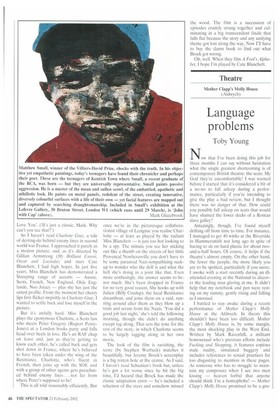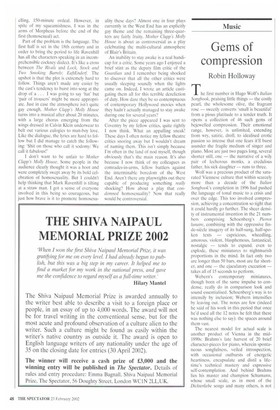Mother Clapp's Molly House (Aldwych)
Language problems
Toby Young
Now that I've been doing this job for three months I can say without hesitation what the single greatest shortcoming is of contemporary British theatre: the seats. My God they're uncomfortable! I was warned before I started that it's considered a bit of a no-no to fall asleep during a performance, particularly if you're intending to give the play a bad review, but I thought there was no danger of that. How could you possibly fall asleep on seats that would have shamed the lower decks of a Roman slave galley?
Amazingly, though, I've found myself drifting off from time to time. For instance, I managed to get 40 winks at the Riverside in Hammersmith not long ago in spite of having to sit on hard plastic for about twoand-a-half hours. Of course, it helps if the theatre's almost empty. On the other hand, the fewer the people, the more likely you are to be spotted, particularly if you snore. I awoke with a start recently during an illattended evening at the National to discover the leading man glaring at me. It didn't help that my notebook and pen were resting on my tummy, gently rising and falling as I snoozed.
I battled to stay awake during a recent performance of Mother Clapp's Molly House at the Aldwych. In theory this shouldn't have been too difficult. Mother Clapp's. Molly House is, by some margin, the most shocking play in the West End. Written by Mark Ravenhill, a militant homosexual who's previous efforts include Fucking and Shopping, it features copious male nudity, simulated buggery and includes references to sexual practices far too disgusting to mention in these pages. As someone who has to struggle to maintain my composure when I see two men kissing — heaven forbid that anyone should think I'm a homophobe! — Mother Clapp's. Molly House promised to be a gru
citing. 150-minute ordeal. However, in spite of my squeamishness, I was in the arms of Morpheus before the end of the first (homosexual) act.
Part of the problem is the language. The first half is set in the 18th century and in order to bring the period to life Ravenhill has all the characters speaking in an incomprehensible cockney dialect. It's like a cross between The Rivals and Lock, Stock and Two Smoking Barrels: EaftEnderf. The upshot is that the plot is extremely hard to follow. Things aren't made any easier by the cast's tendency to burst into song at the drop of a . . . I was going to say 'hat' but 'pair of trousers' might be more appropriate. Just in case the atmosphere isn't quite gay enough, Mother Clapp's Molly House turns into a musical after about 20 minutes, with a large chorus emerging from the wings dressed in Calvin Klein underwear to belt out various eulogies to man-boy love. Like the dialogue, the lyrics are hard to follow but I did manage to catch the following: 'Shit on those who call it sodomy/ We call it fabulous?'
I don't want to be unfair to Mother Clapp's Molly House. Some people in the audience clearly thought it was a hoot and were completely swept away by its bold celebration of homosexuality. But I couldn't help thinking that Mark Ravenhill is tilting at a straw man. I got a sense of everyone involved in this being so courageous, but just how brave is it to promote homosexu
ality these days? Almost one in four plays currently in the West End has an explicitly gay theme and the remaining three-quarters are fairly fruity. Mother Clapp's Molly House is about as controversial as a play celebrating the multi-cultural atmosphere of Blair's Britain.
An inability to stay awake is a real handicap for a critic. Some years ago I enjoyed a brief stint as the deputy film critic of the Guardian and I remember being shocked to discover that all the other critics were usually sleeping soundly when the lights came on, Indeed. I wrote an article castigating them all for this terrible dereliction of duty. How dare they be so contemptuous of contemporary Hollywood movies when they hadn't actually managed to stay awake during one for several years?
After the piece appeared I was sent to Coventry by my fellow critics, quite rightly I now think. What an appalling sneak? These days I often notice my fellow theatre critics snoring away but 1 wouldn't dream of naming them. This isn't simply because I'm often in the land of nod myself, though obviously that's the main reason. It's also because I now think of my colleagues as comrades-in-arms, fellow battlers against the interminable boredom of the West End. Aren't there any playwrights out there capable of producing something really shocking? How about a play that condemned homosexuality? Now that really would be controversial.







































































 Previous page
Previous page